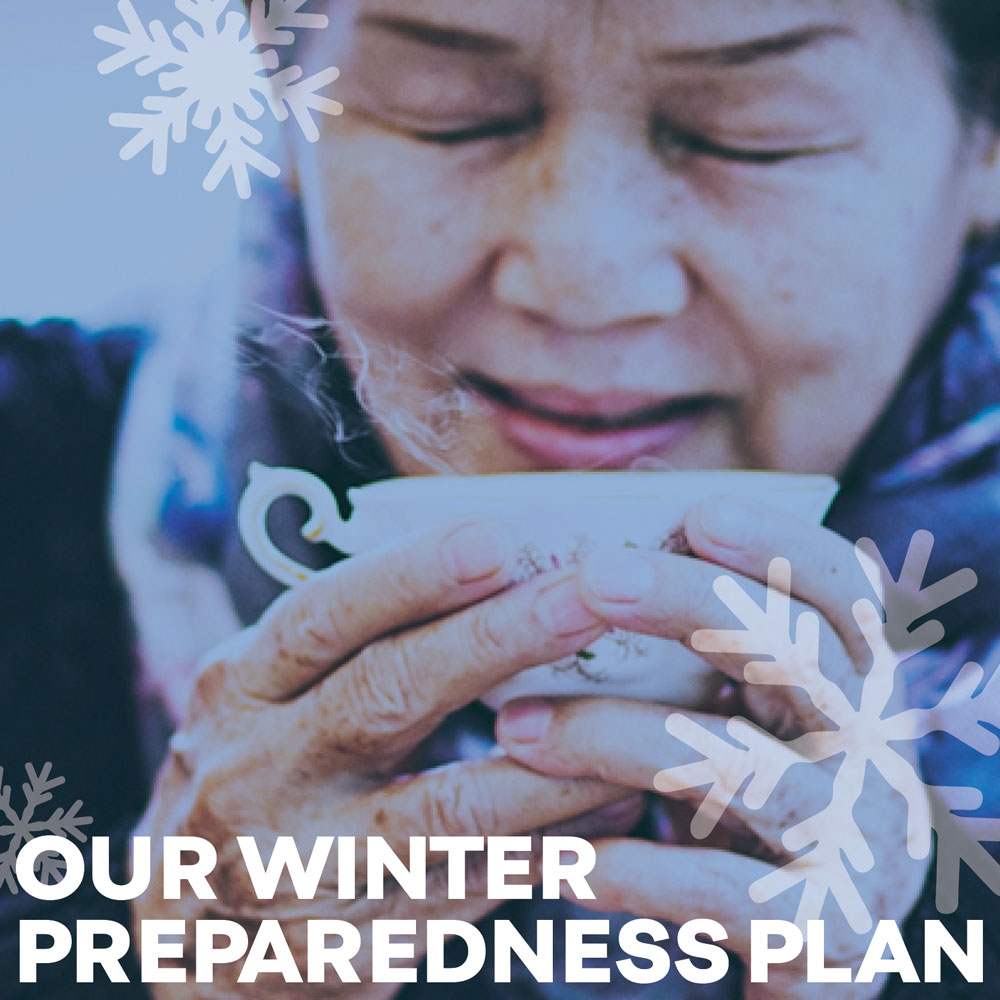Home Health Care Winter Preparedness Plan

Winter weather can impact daily routines but preparing for severe weather challenges can protect seniors from dangerous conditions. From fall prevention and dressing appropriately to maintaining a sense of community, seniors and their loved ones should be mindful of different scenarios to remain comfortable and secure in colder weather. Here’s an overview of tips to keep in mind so our seniors can stay safe and healthy.
How Seniors Can Prepare for Winter
Dress for the Weather
Elderly individuals older than 65 years old account for half of recorded deaths from accidental hypothermia. Moreover, research has found that the rate of cold-related deaths for people aged 75 years and over was significantly higher than that of younger individuals. Older adults can help to prevent hypothermia during colder weather by covering all exposed skin when outdoors and wearing several layers. This can include wearing thermals, a heavy coat, a warm hat and gloves, a thick scarf to cover the nose and mouth, and warm socks.
If you or your loved one’s skin turns red, dark, or begins to hurt, head inside immediately to warm up. If skin appears waxy, white or ashy, or feels numb, run that area under warm water to see if you can relieve these symptoms. However, if they continue, this may be a sign of frostbite, which signals a need for medical attention.
Check Carbon Monoxide & Smoke Detectors
It’s commonplace to use gas heaters, fireplaces, space heaters, and other appliances to heat one’s home during the winter. However, unless they are properly cleaned and vented, this can result in carbon monoxide poisoning due to leaking. It’s crucial to ensure you or your loved one has a functional carbon monoxide detector since this highly toxic gas has no odor and can lead to fatalities. Checking smoke detectors is also paramount for fire safety.
As cooler temperatures arrive, check your detectors’ batteries and buy new sets if necessary. Make certain they’re strategically placed throughout your residence such as near a fireplace, kerosene heaters, or wooden stoves. It’s also crucial to schedule annual HVAC and chimney inspections (if applicable) before winter weather hits to perform maintenance as needed. Finally, don’t heat your home with appliances that aren’t manufactured for heating such as a gas stove or your car, as this can lead to carbon monoxide poisoning.
Prepare for Emergencies
Whether you or your loved one is at home or on the road, preparing for the unexpected such as power outages or car issues can save lives.
Tips on Preparing for Power Outages
- Keep extra batteries on hand for flashlights
- Consider purchasing a battery-powered radio
- Stock the pantry with non-perishable items
- Have winter clothes and blankets easily accessible
Tips on Weather-Proofing Your Car for Winter
When possible, avoid driving in severe weather conditions, especially on narrow roads. Appointment transportation services from a home care agency can also benefit seniors.
Other car safety tips to keep in mind:
- Schedule a car inspection to check windshield wipers, tires, brakes, oil, the car battery, etc.
- Make sure your phone is charged and let someone know where you’re going
- Consider a AAA membership
- Keep items in the car such as:
- Jumper cables
- Blankets
- Windshield scraper
- Flashlights
- Water and non-perishable food items
- First aid kit
- Map
- Rock salt for tires
- Shovel
Invest in Community
As everyone remains indoors, it’s difficult to feel connected to our loved ones and community members. This may lead to seniors feeling isolated and lonely, which can lead to serious health conditions such as depression, anxiety, dementia, and increased risk for strokes.
To combat these feelings, it’s best for family members, neighbors, and friends to check in with their senior loved ones via phone, FaceTime, or otherwise. In-home caregiving or adult day care services can also make a significant difference so that seniors can interact with peers and retain strong bonds.
Maintain Walkways
Icy pavements and roads can easily result in falls, which can cause major injuries like head trauma and hip fractures. In addition to wearing shoes with traction, seniors or their loved ones can hire help to clear away snow and salt walkways to ensure fall prevention.
If they use a cane, replace the tip if it’s worn to make walking easier and more stable. Additionally, it’s best to take shoes off by the door to prevent wet surfaces around the house.
Consider Meal Preparation Services
Spending more time indoors, especially alone, can lead to nutritional deficiencies such as a vitamin D deficiency. A vitamin D deficiency can result in medical problems such as cognitive decline, osteoporosis, and depression. A home care provider can prepare meals to guarantee seniors receive the custom nutrition and care they need to live a healthy lifestyle. For instance, a caregiver can prepare foods packed with vitamin D such as seafood like tuna, eggs, mushrooms, and oatmeal.
Get Vaccinated
As the COVID-19 pandemic continues, continue to follow instructions from health officials and your doctors. The Centers for Disease Control and Prevention (CDC) recommends everyone 5 years of age and older get a COVID-19 vaccination, and everyone ages 18 and older should get a booster shot. Moreover, research shows “People 65 and older who received both doses of either Pfizer or Moderna vaccines showed a 94% reduced risk of COVID-19 related hospitalization.” By getting vaccinated, you and your loved ones can help protect themselves and others. You can schedule an appointment at your local pharmacy or doctor’s office.
In addition, getting flu shots can also help prevent hospitalization, as individuals ages 65 years and older are at a higher risk of developing serious flu complications.





